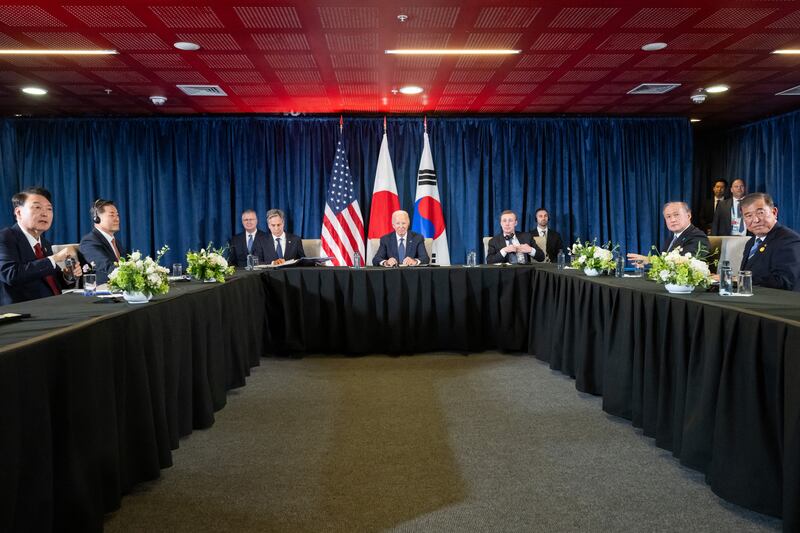The foreign ministers of South Korea and Japan stressed the importance of trilateral ties with the United States at a news conference on Monday during a two-day visit to Seoul by Takeshi Iwaya, the first visit to the country by a Japanese foreign minister in nearly seven years.
His meeting with his counterpart, Cho Tae-yul, comes at a time of political flux, with South Korean President Yoon Suk Yeol facing impeachment after an unsuccessful attempt to declare martial law and the U.S. a week away from the inauguration of a new president.
“I believe trilateral cooperation will continue under the Trump administration,” Cho said Monday, according to Reuters, while Iwaya said he would raise the issue with the incoming U.S. administration, saying the three-way relationship was more important than ever considering the global situation.
But Donald Trump’s return to the White House has caused concern in some quarters about America’s security commitment to the two U.S. allies, which both host U.S. forces on their soil.
During Trump’s first term, he unsuccessfully pushed Japan to quadruple its funding for the 50,000 American troops based there, making similar demands on South Korea for the nearly 30,000 American forces stationed there.
In the end, Trump didn’t follow through with threats to cut the U.S. troop presence in the two countries, although he has hinted recently he may pick up where he left off.
RELATED STORIES
North Korea fires a missile ahead of Trump inauguration
US aims to deter China, North Korea with new space force unit in Japan
North Korea’s Kim plays down prospect of better US ties under Trump
Trump may also resume attempts to defuse the regional threat from North Korea by holding another round of talks with its leader, Kim Jong Un. In spite of three meetings between the two during Trump’s first term, the U.S. president failed to get commitments from Kim to abandon his nuclear and missile programs.

The Biden administration did not engage with the North Korean leader who has increased his saber rattling recently.
Over the past year Kim has abandoned plans for North-South reunification, threatened Seoul with annihilation, fired missiles into the Sea of Japan, and forged closer ties with Russia.
Kim’s June 2024 meeting with President Vladimir Putin, raised concerns that Moscow would provide Pyongyang with technology for its missiles, which can strike U.S. cities, in return for the North sending troops to help Russia fight Ukraine.
North Korea has ramped up its weapon testing program in the days leading up to Trump’s inauguration. Last week, it launched what it called a new hypersonic missile as outgoing U.S. Secretary of State Antony Blinken visited Seoul.
Another Kim-Trump meeting may be on the cards this year, South Korea’s Yonhap news agency reported on Monday. South Korea’s spy agency the National Intelligence Service said a “small agreement” on Pyongyang’s nuclear policy was possible if the incoming U.S. president reopens talks.
“There is a possibility that Trump could seek dialogue with Kim as Trump himself views his previous summits with Kim as major achievements during his first administration,” the National Intelligence Service said, according to South Korean lawmakers, who attended an agency briefing.
Seoul and Tokyo are keen to ensure Washington takes their views into consideration when the new U.S. administration finalizes its foreign policy objectives.
Japan’s foreign minister will attend Trump’s inauguration on Jan. 20 and try to arrange a meeting between the U.S. president and Japanese Prime Minister Shigeru Ishiba the following month in order to “build a relationship of trust” Iwaya said on Saturday on state broadcaster NHK.

Ishiba, Joe Biden and South Korean President Yoon met on the sidelines of the APEC summit in Peru in November, announcing a trilateral secretariat to focus on economic and defense cooperation.
In his final week in office, Biden is still pushing his Indo-Pacific policy.
The U.S. president, Japan’s Ishiba and Philippine President Ferdinand Marcos Jr. focused in a Sunday telephone call on maritime security and “China’s dangerous and unlawful behavior in the South China Sea,” the White House said.
Edited by Mike Firn.
